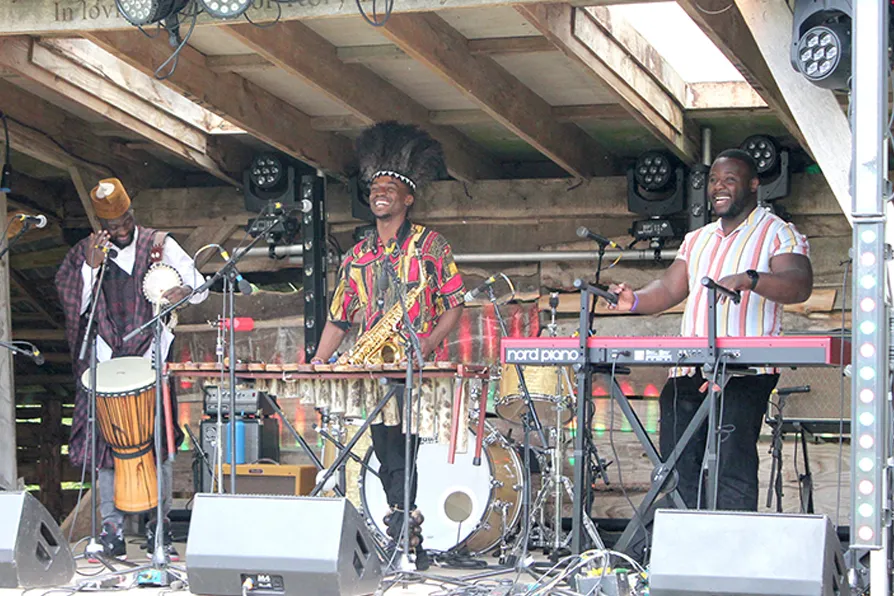GORDON PARSONS applauds a marvellous story of human ingenuity and youthful determination, well served by a large and talented company
GEORGE FOGARTY falls under a spell of an unpretentious gathering that is as edifying as it is entertaining

 The captivating Tawanda. Photo: Justine Glazebrook/Author supplied
The captivating Tawanda. Photo: Justine Glazebrook/Author supplied
Wood Festival
Braziers Park
★★★★
WOOD Festival is the ultimate family festival — affordable, small enough to let the kids run free without getting lost, and full of hands-on activities for all ages.
Alongside workshops on things like thatching, papermaking and willow weaving, to name but three, is the Kindling tent, hosting all kinds of thought-provoking talks and discussions.
One was from Professor Eben Kirkley, an anthropologist specialising in “multi-species ethnography” — the study of how humans have been shaped by other species.
A fascinating example he recounts is of the ARC protein. The remnant of a retrovirus that was contracted by one of our ancient ancestors hundreds of millions of years ago, ARC changed the synaptic gaps between neural pathways, allowing long-term memory formation.
Basically, without this virus, we wouldn’t be able to recollect anything beyond the last 10 minutes. He ends with a cautionary note around gene therapies, both the danger of eradicating supposedly harmful genes that may also have unnoticed beneficial functions and the danger of successful gene therapies becoming the monopoly of the ultra-rich (or wealthy states) due to monopoly pricing facilitated by the merciless application of “intellectual property” rights.
Another interesting talk was from lifelong climate change activist Louise Hazan. She explained the moment her privileged bourgeois bubble was burst during a trip to Philippines when she was nine.
During their stay, her family’s hosts decided they should see Smoky Mountain — a gigantic burning rubbish heap. Seeing another nine-year-old girl out of the car window, and realising she was from one of the many families who lived and worked on the heap, viscerally illustrated to Louise the extremities of global inequality, and seared into her soul a lifelong commitment to tackling it.
Then, of course, there is the music. Tawanda are a three piece with members from Zimbabwe and Nigeria, and their set reflects these diverse origins in a broad range of African music.
The best tracks are built around wondrously infectious grooves, over which saxophone, vibraphone, talking drum or djembe swirl and dance in exuberant flurries. The cross-rhythms alone produce an exhilarating effect, building the tension and passion before locking back in with unfeasible precision.
In the same vein, although with a very different sound, are Jane Weaver’s mesmerising band. Sounding at times like Stereolab, Spiritualised, Can and Tortoise, they combine the funkier edge of post-rock with definite pop sensibilities and melodies to delightful effect.
Weaver’s voice has an incredible range, with definite echoes of Kate Bush at times. Like Tawanda, they are at their best when they lock into a hypnotic groove — the simpler the better — allowing vocals and synths to soar.
Fonda 500 are the perfect Saturday-night headliners, able to transform any occasion into a full-blown party.
The least pretentious band I’ve seen since the Fall, lead singer Simon Stone is barely visible seated on the floor behind his little keyboard in his trademark double bobble hat.
Their songs are a masterclass of scuzzy electropop bolstered by heavy riffing: great tunes, incredible energy and surprisingly hilarious.

New releases from Robert Forster, Self Esteem, and Arve Henriksen

Reviews of A New Kind Of Wilderness, The Marching Band, Good One and Magic Farm by MARIA DUARTE, ANDY HEDGECOCK and MICHAL BONCZA

New releases reviewed by IAN SINCLAIR

Badenoch under pressure to sack shadow justice secretary









